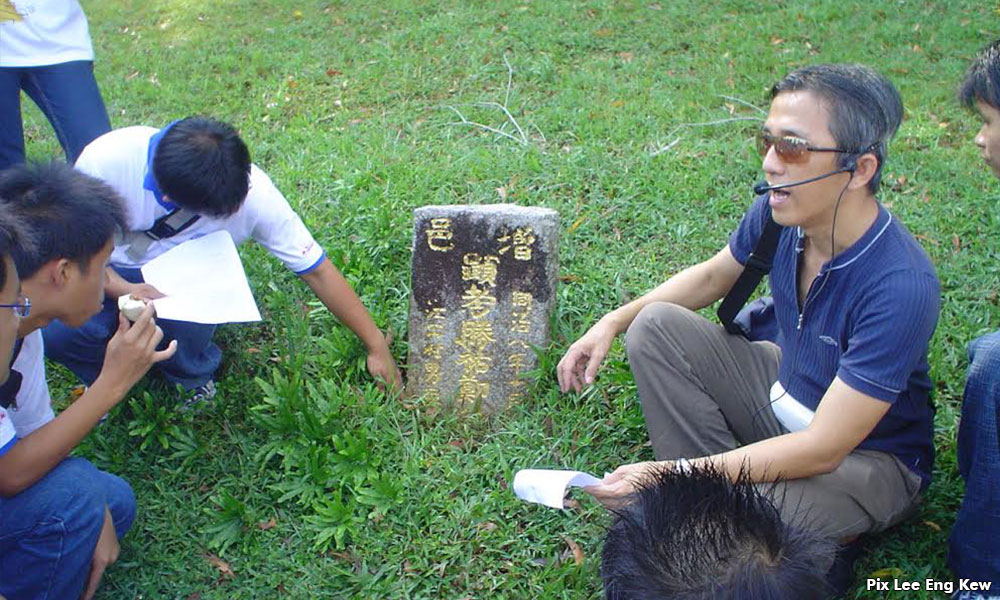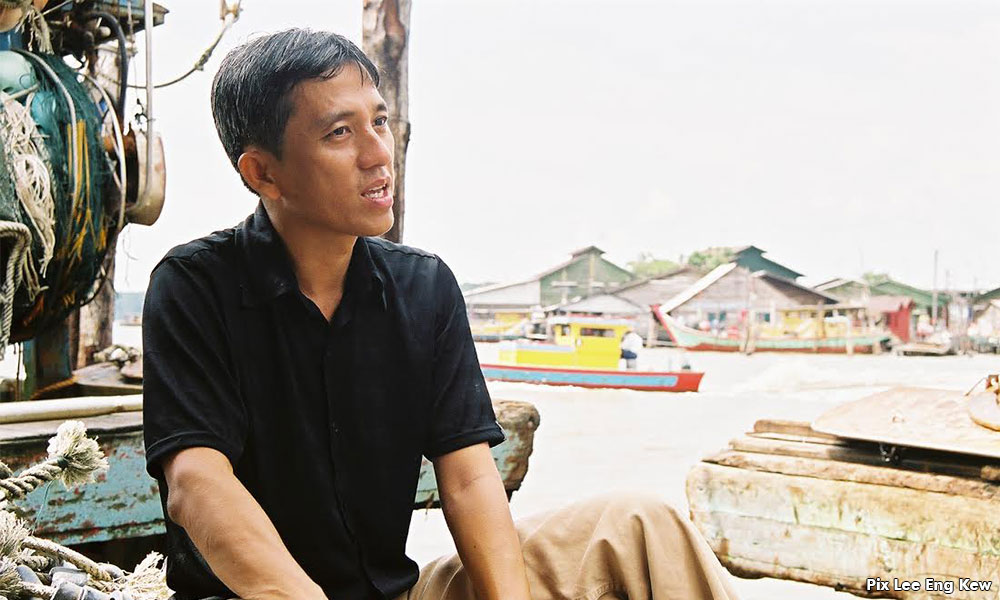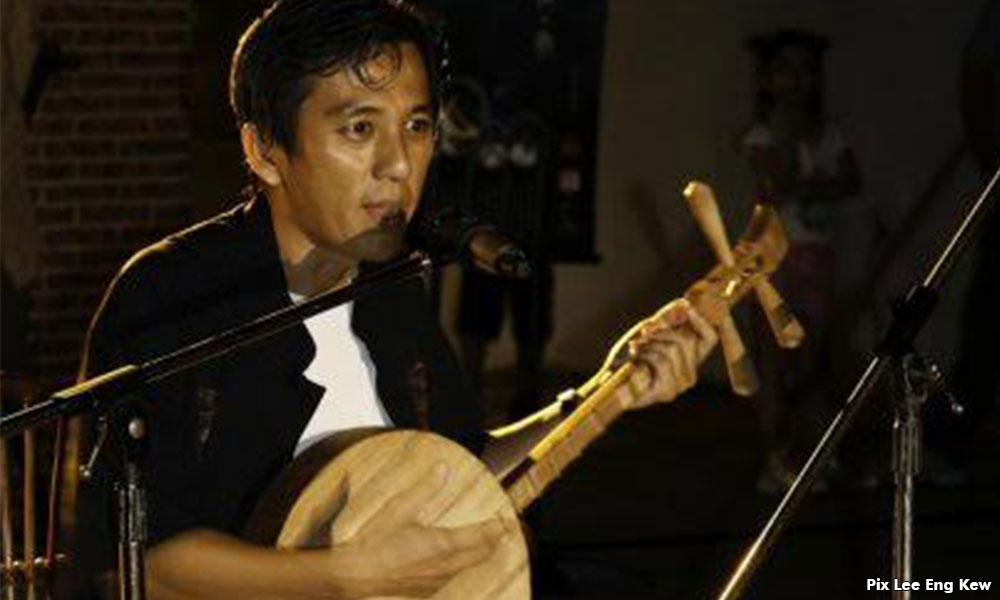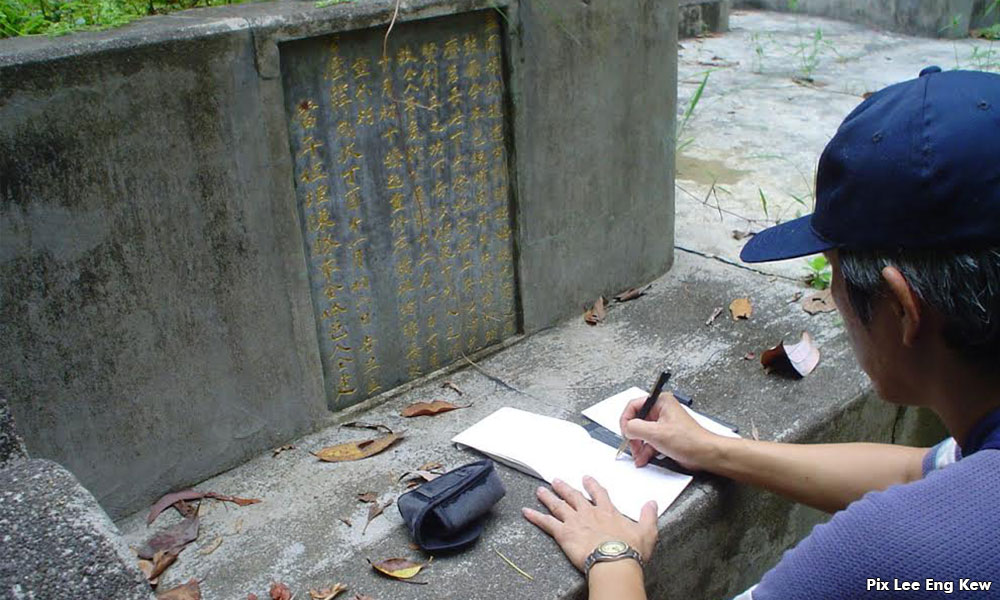MALAYSIANSKINI Little would Lee Eng Kew have imagined that a chat with a frustrated elder would set him on a journey as a full-time field historian and folklorist.
Recalling the incident that took place when he was a teen, the Taiping-born said the elderly man boasted about his grandfather, who used to be the richest man in the area.
A suspicious Lee then did something extraordinary to dig out the truth, by searching for the headstone of the person’s late grandfather.
“It turned out he was telling the truth. His grandfather was a first class officer who secured his position through a donation during the Qing Dynasty in China. The Kwa (surname) family later migrated to Malaya and earned a lavish living in tin mining.

“According to the epitaphs, he donated a piece of land to an English school and in return the school gave free education for his offspring,” said Lee, who is fondly known as Ah Kew, in an interview with Malaysiakini.
The elder, who is now in his 70s, missed the schooling opportunity during the Japanese occupation and ended up as dish-washing worker.
The Kwa family later went bankrupt after the second generation became so passionate in helping China’s Kuomintang fight off Japan’s invasion and neglected the family business, while other siblings became addicted to money-sucking opium.
Since then, Lee, 52, has grown to love history and folk culture. He has explored the the past of the Chinese in Taiping, and piece by piece, he has compiled a history jigsaw through his 37 years of extensive field research.

There were times he travelled nationwide and abroad to record the folklore and cultural customs of local Chinese.
Here’s the story how a Form Three dropout grew to become a person recognised in his field, in his own words.
MY TEACHER USED TO LOOK AT THE LIKES OF ME, who together with my classmates had a poor command of Bahasa Malaysia and English, as bad students who would end up working at char kuey teow stalls one day.
The problem was, we were better in other subjects.
I later worked at a construction site for two years before helping my father at his kuih stall.
Those were busy days where I had to rest for days after long hours of work in preparing kuih for festival celebrations and worship purposes. I could barely squeeze out time for field research.
I TOLD MY 77-YEAR-OLD DAD I WOULD QUIT helping him in 2004. It was basically like forcing him to retire as he could not operate without me.
Even so, I could not proceed with my plans to be a full-time field historian and folklorist as well. I could not apply for a scholarship to pursue my studies in history and Chinese literature.
The same year, my mother suffered a stroke and I took care of her until she passed away in 2014.
BUT I DID NOT GIVE UP MY DREAM. I read about how other senior historians and folklorists had succeeded in their careers.
During this period, I could only take short trips as I was not comfortable to leave my mother in the hand of a hired maid, whom I thought had not done a good job in taking care of my mother.
I chatted with the elderly folk to record oral history. I went to the temples, guilds and graveyards to record the epitaphs, every word of them.
I ALSO PERFORMED IN HOKKIEN OPERA AND FOLK MUSIC, plucking the yueqin, a four-string instrument with a full-moon-shaped-sound box, when I was invited to a religious festival and folk music concert.

Back in the 1940s, some of the poor folk artists would carry a yueqin together with fortune sticks to attract rural folk as they went house to house.
The people would seek divine advice, with each consultation costing about 5 sen. The artist then would hum a small part of a song before reading out the interpretation.
There were times when a few families would pool their funds to have the artist sing the full opera, which would last for two hours, for 5 Malayan dollars.
This performing art was a necessity, especially among the rural Chinese who could not afford a radio then.
I decided to revive the art which disappeared in the 1990s when the last batch of folk artists passed away.
I know about yueqin as it is similar to the erhu, a two-string musical instrument using a bow that I learned to play when I was young.
MANY IN MY PROFESSION WERE FORCED TO QUIT BECAUSE they could not sustain themselves as full-time field historians and folklorists.
Many families, including mine, dissuade their children from staying in the field.

For me, passion is the best cure for the hardships encountered in the process. It makes me enjoy every journey and discovery, and I have no plans to quit.
I even travelled to Singkawang in northern Kalimantan, Indonesia in 2015 to see for myself how local Chinese and Dayak Christians participate in and celebrate Chap Goh Mei.
The place was so remote and ‘behind time’ and the people were celebrating the festival as though they were still in the 1970s. It was quite fascinating.
I AM A THRIFTY GUY WHO COULD SPEND RM300- RM400 A MONTH FOR FOOD. I used to buy dishes from economy rice or ‘chap fan’ stalls and cooked a pot of rice for the whole day. In the morning, I just take bread or biscuits with coffee.
I choose to take the cheapest hostels and transport and would survey for the cheapest mineral water in the surrounding area.
I MAKE A LIVING FROM WRITING. I am also a freelance writer who trained myself to write from a young age.
There were times when I worked as a teacher/tutor in Taiping, but honestly I didn’t like this boring job.
I began with writing ghost and supernatural stories that attracted the readers. Over time, I wrote about folklore, culture, customs and history.
I earned some remuneration by having my articles published in Chinese dailies, which I later compiled into books.
I would not ask the publisher or any other party to provide funds to publish my books because I had been turned down before. It would be better to self-fund the publishing of my books.
I have published four books, each cost me up to RM20,000. Fortunately, I broke even one or two years after the books were first published.
My books have been exported to both Singapore and Taiwan as well. They have been used as reference material for university students who are writing their theses.
Recently I was invited to become a host of a Chinese programme on cultural customs which will be aired on a pay-television service in April.
WE CANNOT RELY ON THE GOVERNMENT TO PRESERVE LOCAL HISTORY AND CULTURAL CUSTOMS as they may lack resources and funding.
It is better for us in civil society to do our part.
I speak many local Chinese dialects, and this enables me to record the history and folklore of the Chinese in Malaysia.
I could not do the same in recording the history of other ethnic groups, as I could not speak fluent Bahasa.
Secondly, I may not be able to get them to tell the truth. You see, there is a disparity of how different ethnic groups view the same piece of history.
I once wrote about a well-known figure in Taiping history, Panglima Ah Chong, who was executed by the British colonial government and who is said to have turned himself into a white crocodile that ate only British people.
In the article, I wrote about how the Malay community liked him as he protected them, too.
Only very recently when I was shown a thesis about Panglima Ah Chong, did I realise that he had been portrayed as an ungrateful man who murdered Malays despite having been adopted by a Malay family.
In fact, from folklore, we could fathom that Chinese immigrants were regarded as outsiders who came to grab their resources in the early days.
I WOULD LIKE TO ENCOURAGE PEOPLE TO WRITE EPITAPHS when someone in the family passes away.
I have travelled quite extensively and visited all the Chinese cemeteries nationwide, except those in Sabah. I found that not many wrote epitaphs for their late family members.
But this is a good way to remember your ancestors and family members. Memories would fade and books would disappear, but the epitaphs would not be gone.
Do not ever think being a layman, you are unworthy of your deeds being recorded on a headstone.
Malaysianskini is a series on Malaysians you should know.
Previously featured
Doctor bids to destigmatise mental illness
The ‘Puan Sri’ who fights for the environment
I’m no freak, says ‘outsider artist’ Rahmat Haron
The real 'Tauke' of Malaysian football
Zunar - the makings of Malaysia’s most dangerous cartoonist
Gerai OA empowering Orang Asli women through craft
How four teens cook up a solution for food wastage
Organic farmer now lighting up Borneo's interiors

